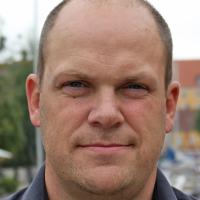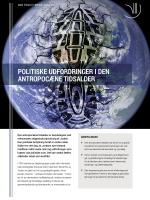The global climate negotiations: New coalitions and Danish priorities
Are new coalitions reshaping climate negotiations? And what is Denmark’s priorities at the COP23 climate negotiations? Those were the key topics at a recent DIIS seminar on global climate change in a changing world, with presentations from Denmark’s Chief Negotiator Anette Ejersted, and climate negotiation expert Lau Blaxekjær.
A key theme was the shifting dynamics in the traditional North-South faultline of the negotiations. Lau Blaxekjær, Assistant Professor at the University of the Faroe Islands, discussed how a variety of new negotiation groups and alliances have emerged since the infamous 2009 Copenhagen negotiations – especially within the G77+China Group – as differences in the interests and situation of different countries and regions evolve. One related development is the movement of some developing countries towards a position that climate action is by necessity a shared responsibility involving both North and South, rather than a differentiated one.
Blaxekjær also pointed to other key developments influencing negotiation outcomes, including: (i) a shift in negotiation responsibilities in many countries from technical ministries to foreign affairs ministries, leading to a greater emphasis on diplomatic efforts to secure broader commitments; (ii) the emergence of a bottom-up process in which countries developed their own contributions to the agreement, and (iii) the sometimes overlooked role of individual mediators and “free diplomats” who influence the negotiations. According to Blaxekjær, these factors, along with the changing positions and new negotiation groups, played an important role in achieving the Paris Agreement.
Anette Ejersted, Chief Negotiator in the International Office of the Danish Ministry of Energy, Utilities, and Climate outlined expectations for the COP23 negotiations. She regretted the US decision to withdraw from the Paris Agreement, but pointed to the consistent support to the agreement from key stakeholders since then. She further emphasized the importance of the Climate Action Agenda which runs parallel to the negotiations, and which evolve around the implementation actions of both state and non-state stakeholders such as local governments, businesses and civil society organisations.
COP23 was originally intended to focus mainly on technical negotiations on how the Paris Agreement is to be implemented. This includes how progress and compliance is measured and reported, as well as how to undertake two key events in the gradual scaling up of ambitions under the agreement – namely the 2018 Facilitative Dialogue and the 2023 Global Stocktake. Both events will review progress on the aims of the Paris Agreement, and provide the basis for countries to increase their level of ambition on mitigation and adaptation. A key priority for Denmark is to ensure that the Global Stocktake goes beyond simple status reports, to also focus on identifying succeful options and tangible opportunities for climate action.
COP23 will however also inevitably become more political than expected, given the US announcement of its intention to withdraw from the agreement. The follow-on effects of this on COP23 remain unknown, including how it will affect the position of China and the changing alliances in the negotiations. One persistent issue is North-South financing, which will include a dialogue over the so-called 2020 Road Map, but also potentially how to move towards the next financing goals set for 2025. A key priority for Denmark in terms of financing is to mobilize private investments. This includes using public funds to catalyze private funding, to mobilize institutional investors through blended finance instruments, and to seek to redirect finance flows towards climate friendly investments.
The subsequent discussion touched on a variety of issues including the role of broad coalitions in relation to agreements between the major powers; the role of civil society and the private sector vis-à-vis the negotiations; the significance of adaptation financing, and how human rights and related issues might be incorporated in the process.
DIIS Eksperter


